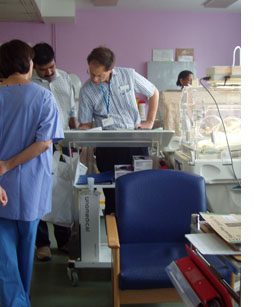|
Blood Tests
Blood sampling can tell doctors alot about how a baby is doing. Most blood tests are taken by pricking the heel or inserting a fine needle briefly into a vein in the hand or foot. This page hopes to explain some of the terms you will often hear when doctors are talking about blood results.
 Blood gases: Blood gases:
By taking a small blood sample, doctors are able to monitor oxygen and carbon dioxide levels in the body, and assess the baby's respiratory status, i.e. how well they are breathing. Blood sugar level:
If a baby cannot control the amount of sugar in his or her blood, they may need to be given extra glucose (to raise their sugar level) or insulin (to lower it). Any baby can have blood sugar problems, but those born to diabetic mothers, or low birth weight babies are at particular risk.
Haemoglobin:
This is the iron part of blood which carries oxygen. Low haemoglobin (Hb) levels (anaemia) may cause a baby to become tired. It is common for babies to require a blood transfusion due to low Hb levels. Blood cultures:
Most babies will have a blood culture taken on admission to screen for infection.
This blood is placed in a special petri dish in a lab that allows infectious organisms to grow over a 24 to 72-hour period.
Serum Bilirubin (SBR):
Bilirubin is a substance in the blood that is produced by the breakdown of red blood cells. Accumulated bilirubin can cause a baby's skin colour to look yellow, or jaundiced. A blood test is performed to determine the amount of bilirubin in the blood.
Guthrie Test:
This test is performed on every baby born in the UK. It screens for a number of genetic conditions such as phenylketonuria (PKU), hypothyroidism, sickle cell anaemia, and thalassaemia.
Antibiotic Levels:
Some antibiotics such as gentamicin and vancomycin have a narrow therapeutic range, i.e. too much may be harmful, and too little may be ineffective. This means that we occasionally need to check levels of these antibiotics so that we can change the dose where necessary.
Weekly Blood Tests Babies will have routine blood tests taken weekly (usually on Monday morning) to monitor:
Full Blood Count (FBC): a blood test that counts the number of red blood cells, white blood cells and platelets. This test is useful in helping to detect infection.
Urea and Electrolytes (U & Es): This looks at amounts of urea, and minerals (i.e. sodium and potassium) in the blood. Urea is a waste product found in the blood and caused by the normal breakdown of protein in the liver.
C-Reactive Protein (CRP):
a protein that the body releases in response to inflammation. Elevated levels of CRP in the blood can suggest infection somewhere in the blody.
Liver Function Tests (LFTs):
A number of tests that measure the health of the liver by checking the levels of various chemicals in the blood. |



